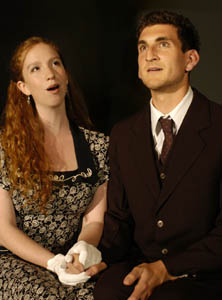![[Metroactive Stage]](/stage/gifs/stage468.gif)
[ Stage Index | Santa Cruz Week | SantaCruz Home | Archives ]
Weill, You Were Seeping
'Street Scene' captures Kurt Weill's talent for bleeding American musical styles into classical opera
By Rob Pratt
The theater arts department at UC-Santa Cruz has long provided unique and imaginative theater for the surrounding community--even producing the single largest regional arts event in the county with the annual Shakespeare Santa Cruz festival. Perhaps because of the university connection, Santa Cruz has a small but committed theater scene that, from time to time, delivers shows of quality. Judging by the spirited production of Kurt Weill's opera Street Scene, presented last week by the UCSC music department, Santa Cruz has another locus of arts energy and inspiration in the university's growing opera program.
Led by artistic director Brian Staufenbiel and conductor Nicole Paiement, UCSC's opera department produces a full-scale opera at the end of each school year. Weill's Street Scene is a magnificent work with dark themes and gorgeous music, and it's unfortunately lesser-known among mid-20th-century works that attempted to meld the European opera tradition into an American art form.
Weill's greatest operas rely on biting social satire and music that draws on American styles, notably ragtime and jazz. Weill's admiration of jazz is apparent in both of his greatest works, The Threepenny Opera and Rise and Fall of the City of Mahagonny, both created with librettist Bertolt Brecht.
After emigrating from his native Germany to America during the 1930s, Weill strove--like Gershwin, Aaron Copland and Leonard Bernstein, among others--to create a new form of opera that brought popular American musical forms into "collision" (as Weill termed it) with classical tradition. Street Scene marks a highwater mark of that cause. Weill drew upon Elmer Rice's 1929 play of the same name, a complex story of seduction and betrayal set in a lower-class neighborhood of New York City. For the songs, Weill and Rice enlisted Harlem Renaissance poet Langston Hughes to write lyrics.
To Staufenbiel and Paiement's credit, the cast and orchestra of UCSC's Street Scene seemed to have a native understanding of the story and the music and how the two work together in the emotional arc of the show. Credit also goes to Weill, who knew that young people would immediately latch on to the elements of American popular music in the score and become receptive to the story.
Where the production doesn't work well is in the fine points of musical and dramatic technique. UCSC's Street Scene is a student production, and even the strongest singers have an overwhelming challenge in equaling Weill's music, which was written for singers with operatic range. The tenors in this production have difficulty with the topmost pitches, though Chad Kranak as the romantic lead and Laurent Martin as the comic next-door neighbor delivered many very musical moments. Laura Anderson also performed strongly as the adulteress wife of an abusive husband. Paiement's student orchestra played with clarity, balance and a gorgeous blend, rendering lyrical passages exceptionally well and only faltering when called upon to play jazzy, Broadway styles.
Copyright © Metro Publishing Inc. Maintained by Boulevards New Media.
For more information about Santa Cruz, visit santacruz.com.
![]()

Hand in Glove: Sheila Willey and Adam Caughey in UCSC's production of Kurt Weill's opera 'Street Scene.'
From the June 9-16, 2004 issue of Metro Santa Cruz.